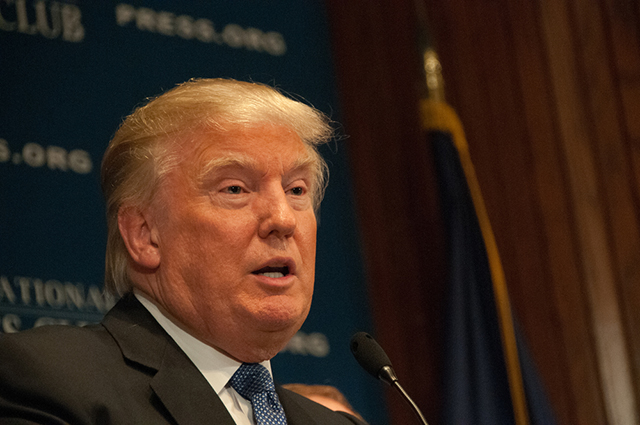
Honest, paywall-free news is rare. Please support our boldly independent journalism with a donation of any size.
Last week, Republican presidential candidate Donald Trump released his plan for changing the tax code. Trump wants big across-the-board tax cuts, with the largest tax cuts going to the wealthy. He claimed that his tax cut won’t lead to a loss of revenue since it would lead to a huge spurt of economic growth. His number was 6.0 percent annual growth over the next decade, topping Jeb Bush’s 4.0 percent growth rate by two full percentage points.
Many of the reports on the plan commented on the growth assumption and pointed out that few, if any, economists took it seriously. As a practical matter, we have seen this story before. Ronald Reagan put in place a large tax cut in the 1980s and George W. Bush did the same in the last decade. You have to try very hard to find a positive growth effect from either. Certainly no one could make the case with a straight face that these sorts of tax cut proposals could even get us to Bush’s 4.0 percent number, much less Trump’s 6.0 percent.
But apart from what the tax cuts may or may not be able to do in terms of growth, there is also the matter of how the Federal Reserve Board would react. If that sounds strange, you should be very angry at the reporters at your favorite news outlet, because they should have been talking about this part of the picture.
Suppose that Donald Trump’s tax cut really is the magic elixir that would get the economy to grow 6.0 percent a year. But what if the people at the Fed’s Open Market Committee (FOMC) don’t recognize this fact? After all, many on the FOMC want to raise interest rates now because they think the economy’s current 2.0 percent growth rate is too fast.
If the FOMC thinks the economy is still bound by the pre-Trump tax cut rules then it will believe that inflation will start to accelerate out of control if the unemployment rate falls much below its current 5.1 percent level. In this case, the Fed would raise interest rates when they saw the Trump tax cuts boosting growth and lowering unemployment.
Higher interest rates would slow house buying and new construction, discourage car sales and put a crimp in both public and private investment. If the Fed raises interest rates high enough, it could fully offset the boost that Trump’s tax cut is giving to the economy. That would mean that even though the Trump tax cuts might be the best thing for the economy since the internet (okay, better than the internet), we wouldn’t see any growth dividend because the Fed would not allow it.
For this reason, reporters should be asking questions about the Fed’s response to a tax cut. If the Fed is likely to simply slam on the brakes to offset any possible stimulus, then a tax plan will have little prospect of boosting growth.
Of course this logic applies across the board to any economic proposal the candidates put forward. Senator Sanders wants to boost the economy by spending on infrastructure. Both Senator Sanders and Secretary Clinton are proposing measures to promote paid family leave and increase the availability of child care. In both cases, the candidates argue their proposals will be good for growth, in addition to making it easier for people to balance the demands of work and family.
In each of these cases, it is important to ask about the reaction of the Federal Reserve Board. If additional spending creates more jobs, or a reduction in the length of the average workweek or work year allows more people to be employed, then the Fed will factor this job growth into its decisions on interest rates. If the FOMC holds the view that more jobs and lower unemployment increase the risk of inflation, then it can raise interest rates enough to reverse the boost to employment.
The Fed is a central player in determining the rate of growth and the level of employment. The public should understand this fact. It means that the when a candidate puts forward an economic plan, the question is not just what it will do for the economy, but also what the Fed thinks it will do. This second part of the equation needs to get into the coverage of the presidential campaigns.
A terrifying moment. We appeal for your support.
In the last weeks, we have witnessed an authoritarian assault on communities in Minnesota and across the nation.
The need for truthful, grassroots reporting is urgent at this cataclysmic historical moment. Yet, Trump-aligned billionaires and other allies have taken over many legacy media outlets — the culmination of a decades-long campaign to place control of the narrative into the hands of the political right.
We refuse to let Trump’s blatant propaganda machine go unchecked. Untethered to corporate ownership or advertisers, Truthout remains fearless in our reporting and our determination to use journalism as a tool for justice.
But we need your help just to fund our basic expenses. Over 80 percent of Truthout’s funding comes from small individual donations from our community of readers, and over a third of our total budget is supported by recurring monthly donors.
Truthout’s fundraiser ended last night, and we fell just short of our goal. But your support still matters immensely. Whether you can make a small monthly donation or a larger one-time gift, Truthout only works with your help.